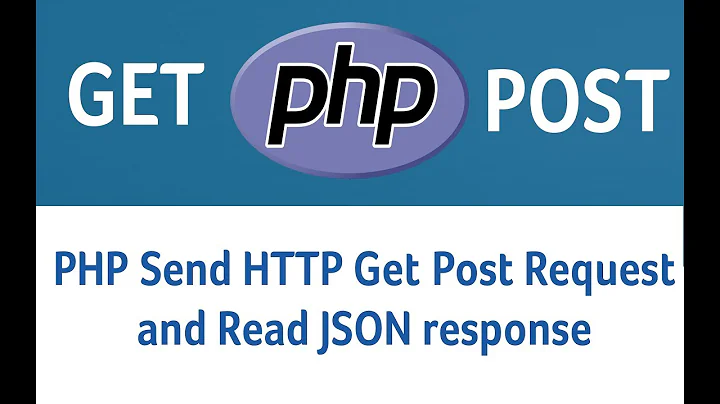Android JSON HttpClient to send data to PHP server with HttpResponse
Solution 1
After lots of reading and searching I have found the problem to be with, I beleive magic_quotes_gpc being enabled on the server.
Thus, using:
json_decode(stripslashes($_POST['vehicle']));
In my example above removes the slashes and allows the JSON to be decoded properly.
Still not sure why sending a StringEntity causes a 403 error?
Solution 2
StringEntity s = new StringEntity(c.toString());
s.setContentEncoding("UTF-8");
s.setContentType("application/json");
request.setEntity(s);
Solution 3
Try this code it works for me
public void postData(String result,JSONObject obj) {
// Create a new HttpClient and Post Header
HttpClient httpclient = new DefaultHttpClient();
HttpParams myParams = new BasicHttpParams();
HttpConnectionParams.setConnectionTimeout(myParams, 10000);
HttpConnectionParams.setSoTimeout(myParams, 10000);
String json=obj.toString();
try {
HttpPost httppost = new HttpPost(result.toString());
httppost.setHeader("Content-type", "application/json");
StringEntity se = new StringEntity(obj.toString());
se.setContentEncoding(new BasicHeader(HTTP.CONTENT_TYPE, "application/json"));
httppost.setEntity(se);
HttpResponse response = httpclient.execute(httppost);
String temp = EntityUtils.toString(response.getEntity());
Log.i("tag", temp);
} catch (ClientProtocolException e) {
} catch (IOException e) {
}
}
Related videos on Youtube
Scoobler
Home coder, playing mainly with PHP/Javascript/MySQL but like to mess around with other things, at the moment Android / Java.
Updated on July 09, 2022Comments
-
Scoobler almost 2 years
I am currently trying to send some data from and Android application to a php server (both are controlled by me).
There is alot of data collected on a form in the app, this is written to the database. This all works.
In my main code, firstly I create a JSONObject (I have cut it down here for this example):
JSONObject j = new JSONObject(); j.put("engineer", "me"); j.put("date", "today"); j.put("fuel", "full"); j.put("car", "mine"); j.put("distance", "miles");Next I pass the object over for sending, and receive the response:
String url = "http://www.server.com/thisfile.php"; HttpResponse re = HTTPPoster.doPost(url, j); String temp = EntityUtils.toString(re.getEntity()); if (temp.compareTo("SUCCESS")==0) { Toast.makeText(this, "Sending complete!", Toast.LENGTH_LONG).show(); }The HTTPPoster class:
public static HttpResponse doPost(String url, JSONObject c) throws ClientProtocolException, IOException { HttpClient httpclient = new DefaultHttpClient(); HttpPost request = new HttpPost(url); HttpEntity entity; StringEntity s = new StringEntity(c.toString()); s.setContentEncoding(new BasicHeader(HTTP.CONTENT_TYPE, "application/json")); entity = s; request.setEntity(entity); HttpResponse response; response = httpclient.execute(request); return response; }This gets a response, but the server is returning a 403 - Forbidden response.
I have tried changing the doPost function a little (this is actually a little better, as I said I have alot to send, basically 3 of the same form with different data - so I create 3 JSONObjects, one for each form entry - the entries come from the DB instead of the static example I am using).
Firstly I changed the call over a bit:
String url = "http://www.myserver.com/ServiceMatalan.php"; Map<String, String> kvPairs = new HashMap<String, String>(); kvPairs.put("vehicle", j.toString()); // Normally I would pass two more JSONObjects..... HttpResponse re = HTTPPoster.doPost(url, kvPairs); String temp = EntityUtils.toString(re.getEntity()); if (temp.compareTo("SUCCESS")==0) { Toast.makeText(this, "Sending complete!", Toast.LENGTH_LONG).show(); }Ok so the changes to the doPost function:
public static HttpResponse doPost(String url, Map<String, String> kvPairs) throws ClientProtocolException, IOException { HttpClient httpclient = new DefaultHttpClient(); HttpPost httppost = new HttpPost(url); if (kvPairs != null && kvPairs.isEmpty() == false) { List<NameValuePair> nameValuePairs = new ArrayList<NameValuePair>(kvPairs.size()); String k, v; Iterator<String> itKeys = kvPairs.keySet().iterator(); while (itKeys.hasNext()) { k = itKeys.next(); v = kvPairs.get(k); nameValuePairs.add(new BasicNameValuePair(k, v)); } httppost.setEntity(new UrlEncodedFormEntity(nameValuePairs)); } HttpResponse response; response = httpclient.execute(httppost); return response; }Ok So this returns a response 200
int statusCode = re.getStatusLine().getStatusCode();However the data received on the server cannot be parsed to a JSON string. It is badly formatted I think (this is the first time I have used JSON):
If in the php file I do an echo on $_POST['vehicle'] I get the following:
{\"date\":\"today\",\"engineer\":\"me\"}Can anyone tell me where I am going wrong, or if there is a better way to achieve what I am trying to do? Hopefully the above makes sense!
-
Toran Billups almost 13 yearsThanks for taking the time to document your issue w/ the 403 response. Had the same thing for a week and your post finally has me moving in the right direction!
-
Scoobler over 12 years@Toran Billups not a problem, I'm glad it has helped you!!
-
 WebDevDanno about 11 yearsYour variables post to your PHP script correctly. How would you pull each variable say "engineer" and "fuel" and insert them into a MySQL database for example. It looks like all you can do is just use the
WebDevDanno about 11 yearsYour variables post to your PHP script correctly. How would you pull each variable say "engineer" and "fuel" and insert them into a MySQL database for example. It looks like all you can do is just use the$_POST['vehicle'];variable. Would very much welcome a response to this.
-
-
Scoobler over 13 yearsThanks Sergey, but I am using a POST method to send the data, not passing parameters for GET from the PHP script.
-
 WebDevDanno about 11 yearsCould you possibly share your PHP file that contains
WebDevDanno about 11 yearsCould you possibly share your PHP file that containsjson_decodebecause I think how my server is decoding the json data (wrongly) may be related to yours. -
 macio.Jun over 10 yearsjson_decode(stripslashes($_POST['vehicle']), true); will return php array, json_decode(stripslashes($_POST['vehicle'])); returns php stdclass obj, which is hard to use. +1 for correct answer, thx
macio.Jun over 10 yearsjson_decode(stripslashes($_POST['vehicle']), true); will return php array, json_decode(stripslashes($_POST['vehicle'])); returns php stdclass obj, which is hard to use. +1 for correct answer, thx





